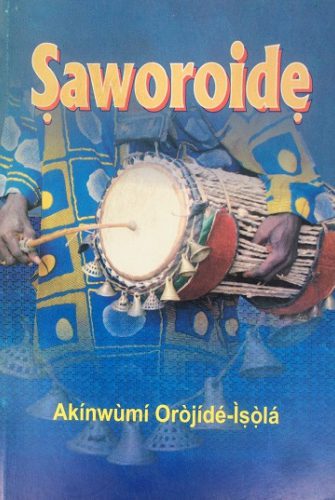Saworoide by Akinwumi Isola tells the story of an oath of uprightness between the citizens of a certain kingdom and their kings as to the responsibilities and the conduct of the kings towards their subjects.

Jogbo being the fictional setting of this narrative is a pointer to a country like Nigeria where leaders default on their campaign promises to their followers. In other words, Jogbo is a symbolic representation of Nigeria which is Akinwumi Isola’s home country.
Professor Akinwumi Isola first wrote this story as a script for a movie titled “Saworoide” which the astute and veteran filmmaker, Tunde Kelani released in 1999.

Professor Isola would later write a novel of the same title and storyline which was published in 2008 by the University Press PLC.

Saworoide is characterised by public theft, corruption, avarice, selfishness, and desperation which have become the distinctive attributes of many politicians. If there is nothing to make them account for their actions or keep them in check, politicians would do as they please. The country would consequently be thrown into a bedlam of chaos and crises while the citizens suffer for their leaders’s recklessness and thoughtlessness.
In 2022, Professor Pamela J. Olubunmi Smith translated Saworoide into the English Language with a new title, The Brass-Bells Drum.

Setting
The setting of Saworoide is a fictional town called Jogbo, presumably in the South-west Nigeria. The founders of this town originated from Oyo-Ile when Oyo-Ile fell apart.
The characteristics of Jogbo are quite akin to those of Nigeria. Jogbo is blessed with natural resources same as Nigeria. The leaders of Jogbo in connivance with their tree-felling foreign investors make life hard for the citizens of Jogbo as the people go about their daily socio-economic activities.
The behavioural patterns of the civilian leaders, military administrators, foreign investors, and the citizens of Jogbo clearly distinguish Jogbo as a fictional replica of Nigeria in different phases of her history.
Plot Summary
There is an oath that exists between the citizens of Jogbo and every king installed to the throne of Onijogbo which binds the leader and the led. This oath exists solely to keep every Jogbo king in check in view of the attendant excesses of power. What signify this convenant with the people are two items, namely, a brass-bells drum and a brass-bell crown. Mismanagement of the town’s resources and affairs comes with very serious consequences as a result of this bond with the people.
However, it is during the reign of King Lapite that things begin to take a different shape. Lapite, wanting to use the conveted position of a king to embezzle and divert public funds for personal use, blatantly refuses to be subjected to incision exercise required for the convenant. He employs wily means to circumvent the system by avoiding taking the oath that will keep his excesses in check as he ascends the throne.
He has barely become the king when he orders the assassination of Adebomi, his contender for the kingship position. The assassins murdered Adebomi and his wife in cold blood.
As if that is not enough, Lapite also sends police officers to arrest Ayangalu in whose custody the brass-bells drum is. But Ayangalu, Ayanniyi, and Adebomi’s son (also the grandson of Ayangalu) manage to escape from the crushing grip of Lapite.
The reason for Lapite’s murderous decisions towards his perceived contenders is not far-fetched. He wants them out of the way because he fears the repercussions of not taking the incision of oath. When he has finally gotten rid of his opposition, Lapite settles down to enjoy the life of opulence the oath would have denied him of.
Lapite literally sits on the kingdom’s treasury as he and his conniving chiefs spend it lavishly without any thing put in place to hold them accountable.
The people of Jogbo continue to suffer for years while the king and his chiefs frolic around. Lapite refuses to give a thought to their suffering. Contented with living an opulent life at the expense of his people, Lapite dons on the garb of nonchalance.
The people try to make him see the hardship they experience through delegations, protests, and later militant actions. They send a delegation to him in private to plead their case. When that fails to yield any positive results, they take to the streets of Jogbo to show their grievances.
When it becomes obvious that Lapite does not care a bit about the welfare of the people and has no intention of ameliorating their hardship, the youths of Jogbo resort to militant actions to disrupt the activities of the tree-felling investors whose proceeds have been funding Lapite’s administration. The activities of the tree-felling foreign investors have in effect pauperised the efforts of farmers, fishermen, and hunters to make a living.
In fact, the freedom fighters do not spare Lapite who of course is the root of these problems. They steal his brass-bell crown with the intent that if the crown lingers outside the confines of the palace for longer than necessary, Lapite will be left with no option than to abdicate the throne for fear of what may happen to him if the crown is not recovered.
However, Lapite does not seem like someone who will willingly abdicate the throne for any reason. Instead of doing so, he reaches out to foreign investors to help him with their private army to recover the crown.
General Lagata who is the head of this private army is then tasked with the responsibility of leading a combined force of Lapite security operatives and Lagata’s soldiers on a military expedition to recover the stolen crown. Lagata is victorious over the militant group and he successfully retrieves the missing crown for Lapite.
However, at the grand ceremony that follows earmarked to commemorate this success, General Lagata and his soldiers wrench power from King Lapite and a few of his resisting henchmen. Lagata justifies his action with the excuse of the excruciating hardship Lapite and his cohort have subjected the people of Jogbo to and the wanton corruption prevalent in the outsted administration. This is how Lagata and his soldiers supplant Lapite from the throne and establish a military junta.
Unfortunately, Lagata’s military government is not any different or better than Lapite’s administration for the people of Jogbo. Instead of the much anticipated relief and good governance, Lagata only replicates everything he has accused the previous administration of. He and two of Lapite’s chiefs, Chief Balogun and Chief Seriki, are embezzling public funds any how they like. They also run the administration of the town recklessly.
But then, Lagata pushes his luck too far. He decides to wear the brass-bell crown to establish the legitimacy of his government and bring the military into the fold of the noble families entitled to the throne of Jogbo. Like his predecessor, Lagata has not taken the incision of oath required for wearing the crown. He is therefore not bond by any oath. Besides, the brass-bells drum must not be beaten near him while he still has the crown on his head.
Consequently, Lagata’s security operatives find Ayangalu and arrest him in the hamlet he has been living in obscurity. They throw him into detention to avert any tragic occurrence on the day Lagata has designated for the wearing of the brass-bell crown ceremony.
At the said event, when Lagata puts on the brass-bell crown, someone drums the brass-bells drum. General Lagata falls and instantly dies of headache. It turns out that Ayanniyi, the son of Ayangalu, whom no one paid attention is the one that has returned from exile to beat the drum in his father’s stead.
The freedom fighters, with the ritual help of Amawomaro, the chief priest, and Ayangalu, the chief drummer, restructure Jogbo. They install young Aresejabata, the son of the assassinated Adebomi, as the new king of Jogbo.
Aresejabata follows the oath rituals required of a Jogbo king at initiation which his predecessors had skipped intentionally. After that, he marries Araparegangan, the bastard daughter of Lapite, whom he has fallen in love with. The kingdom becomes peaceful at last.
Themes
- Themes in Akinwumi Isola’s “Saworoide”
Characters
- Characterisation in Akinwumi Isola’s “Saworoide”
 WHATSAPP: Click HERE to join the new Literature PADI WhatsApp group to receive latest updates on your phone and for further literary discussions!
WHATSAPP: Click HERE to join the new Literature PADI WhatsApp group to receive latest updates on your phone and for further literary discussions!








